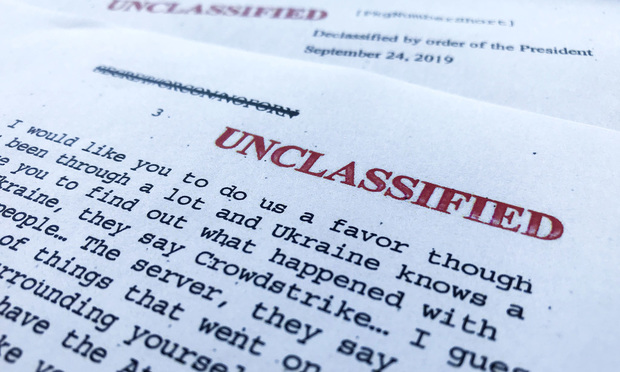New Lawsuit Alleges Illegal 'Shadow' Ukraine Diplomacy at Trump's Direction
"State Department officials charged with carrying out our foreign policy should not be left in the dark about shadow diplomacy carried out through a secret, alternative channel," the complaint reads.
November 05, 2019 at 03:05 PM
4 minute read
 A rough transcript of a telephone conversation between U.S. President Donald Trump with Ukrainian President Volodymyr Zelensky, held July 25, 2019. Photo: Diego M. Radzinschi/ALM
A rough transcript of a telephone conversation between U.S. President Donald Trump with Ukrainian President Volodymyr Zelensky, held July 25, 2019. Photo: Diego M. Radzinschi/ALM
A new lawsuit is alleging that top State Department officials violated record-keeping laws by using "secret" channels to discuss diplomatic moves on Ukraine, specifically President Donald Trump's desire for Ukrainian officials to investigate former Vice President Joe Biden and his family.
In the complaint filed Tuesday in the U.S. District Court for the District of Columbia, the groups Citizens for Ethics and Responsibility in Washington, the National Security Archive and the Society for Historians of American Foreign Relations asked for a court order requiring the State Department to preserve the communications.
"State Department officials charged with carrying out our foreign policy should not be left in the dark about shadow diplomacy carried out through a secret, alternative channel," the complaint reads. "Creating records of U.S. foreign policy is essential to ensure that the critical checks and balances built into our system function as the founders intended, and that the public, private researchers, and historians have access to the full documentary history of this administration."
The complaint, citing media reports, claims that the State Department officials used the secret channels to communicate "at the direction of" Trump and his personal attorney, Rudy Giuliani.
It also alleges that some officials, including Giuliani, former special envoy to Ukraine Kurt Volker and top Ukrainian diplomat William "Bill" Taylor, used the encrypted messaging app WhatsApp to communicate.
It pointed in particular to texts between Taylor and Volker in arguing that the secret, illegal channel existed, and noted the texts weren't obtained by the State Department until they were subpoenaed by Congress.
"These text messages further evidence the irregular or shadow diplomacy channel that was used to, among other things, place pressure on Ukraine 'to deliver on the President's demand for Ukraine to launch politically motivated investigations,'" the complaint reads.
Trump's efforts to push Ukraine to investigate the Bidens are now the subject of an impeachment inquiry in the U.S. House of Representatives. Congressional investigators have deposed Volker and Taylor as part of that inquiry.
How the Trump administration has documented its effort to pressure Ukraine to investigate the Bidens will test the reach of federal records laws, as the White House has faced early claims of trying to suppress the rough transcript of Trump's call with Ukrainian President Volodymyr Zelensky.
The lawsuit does not seek the immediate release of the records. Rather, it requests that they be preserved so they can be released in the future through Freedom of Information Act requests and other methods.
"The failure of Secretary Pompeo and State Department officials to create and preserve records of their conversations and meetings with certain foreign leaders and of their diplomatic efforts conducted through a secret, irregular channel outside of the agency's recordkeeping system have deprived and will continue to deprive the Plaintiffs of access to the documentary history of this administration," the lawsuit said.
"In the process, Plaintiffs and other members of the American public will lose vital information and insight into State Department policies and decision making, which are critical to interpret and prevent illegal or unwise government action."
Attorneys for CREW filed the suit, as did Baker McKenzie lawyers George M. Clarke III and Mireille Oldak.
This complaint echoes another previously filed by CREW over records on Trump's contacts with foreign leaders. That suit also did not seek the immediate release of those records, but claimed that Trump's office was violation of record-keeping law and sought a court order to preserve the documents.
In a court filing last month, Justice Department attorneys committed to maintaining those records for the duration of that litigation.
This content has been archived. It is available through our partners, LexisNexis® and Bloomberg Law.
To view this content, please continue to their sites.
Not a Lexis Subscriber?
Subscribe Now
Not a Bloomberg Law Subscriber?
Subscribe Now
NOT FOR REPRINT
© 2025 ALM Global, LLC, All Rights Reserved. Request academic re-use from www.copyright.com. All other uses, submit a request to [email protected]. For more information visit Asset & Logo Licensing.
You Might Like
View All
Read the Document: DOJ Releases Ex-Special Counsel's Report Explaining Trump Prosecutions
3 minute read
3rd Circuit Nominee Mangi Sees 'No Pathway to Confirmation,' Derides 'Organized Smear Campaign'
4 minute read
Judge Grants Special Counsel's Motion, Dismisses Criminal Case Against Trump Without Prejudice

Ex-Deputy AG Trusts U.S. Legal System To Pull Country Through Times of Duress
7 minute readTrending Stories
Who Got The Work
J. Brugh Lower of Gibbons has entered an appearance for industrial equipment supplier Devco Corporation in a pending trademark infringement lawsuit. The suit, accusing the defendant of selling knock-off Graco products, was filed Dec. 18 in New Jersey District Court by Rivkin Radler on behalf of Graco Inc. and Graco Minnesota. The case, assigned to U.S. District Judge Zahid N. Quraishi, is 3:24-cv-11294, Graco Inc. et al v. Devco Corporation.
Who Got The Work
Rebecca Maller-Stein and Kent A. Yalowitz of Arnold & Porter Kaye Scholer have entered their appearances for Hanaco Venture Capital and its executives, Lior Prosor and David Frankel, in a pending securities lawsuit. The action, filed on Dec. 24 in New York Southern District Court by Zell, Aron & Co. on behalf of Goldeneye Advisors, accuses the defendants of negligently and fraudulently managing the plaintiff's $1 million investment. The case, assigned to U.S. District Judge Vernon S. Broderick, is 1:24-cv-09918, Goldeneye Advisors, LLC v. Hanaco Venture Capital, Ltd. et al.
Who Got The Work
Attorneys from A&O Shearman has stepped in as defense counsel for Toronto-Dominion Bank and other defendants in a pending securities class action. The suit, filed Dec. 11 in New York Southern District Court by Bleichmar Fonti & Auld, accuses the defendants of concealing the bank's 'pervasive' deficiencies in regards to its compliance with the Bank Secrecy Act and the quality of its anti-money laundering controls. The case, assigned to U.S. District Judge Arun Subramanian, is 1:24-cv-09445, Gonzalez v. The Toronto-Dominion Bank et al.
Who Got The Work
Crown Castle International, a Pennsylvania company providing shared communications infrastructure, has turned to Luke D. Wolf of Gordon Rees Scully Mansukhani to fend off a pending breach-of-contract lawsuit. The court action, filed Nov. 25 in Michigan Eastern District Court by Hooper Hathaway PC on behalf of The Town Residences LLC, accuses Crown Castle of failing to transfer approximately $30,000 in utility payments from T-Mobile in breach of a roof-top lease and assignment agreement. The case, assigned to U.S. District Judge Susan K. Declercq, is 2:24-cv-13131, The Town Residences LLC v. T-Mobile US, Inc. et al.
Who Got The Work
Wilfred P. Coronato and Daniel M. Schwartz of McCarter & English have stepped in as defense counsel to Electrolux Home Products Inc. in a pending product liability lawsuit. The court action, filed Nov. 26 in New York Eastern District Court by Poulos Lopiccolo PC and Nagel Rice LLP on behalf of David Stern, alleges that the defendant's refrigerators’ drawers and shelving repeatedly break and fall apart within months after purchase. The case, assigned to U.S. District Judge Joan M. Azrack, is 2:24-cv-08204, Stern v. Electrolux Home Products, Inc.










